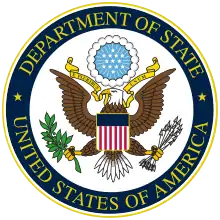Office of eDiplomacy
The Office of eDiplomacy is an applied technology think tank for the United States Department of State. The Office of eDiplomacy is staffed by Foreign and Civil Service Officers, as well as contract professionals. There are three branches, the Diplomatic Innovation Division, the Knowledge Leadership Division and the Customer Liaison Division.
The unit was formed in response to recommendations from the 1999 Overseas Presence Advisory Panel that the State Department improve its ability to communicate and share knowledge.
eDiplomacy's Customer Liaison Division facilitates and enhances communications between the Bureau of Information Resource Management and its global users. With a mandated goal of providing customer (global staff) satisfaction with products, platforms and services developed by the IRM Bureau. In addition, the CLD collaborates with other U.S. Government agencies and multiple other entities to provide information services that advance U.S. security, emergency preparedness, and communications objectives.
History
In 2002, Ambassador James Holmes started the eDiplomacy Task Force. In 2003, the task force was reorganized into the Office of eDiplomacy. Currently, eDiplomacy falls under the Deputy Chief Information Officer for Business, Management, and Planning.
Rahima Kandahari is the current Director, David L McCormick is the Chief of eDiplomacy's Knowledge Leadership Division, Daniel Sheerin is Chief of the eDiplomacy Diplomatic Innovation Division and Veronica Branch is Chief of the Customer Liaison Division.[1]
Other previous eDiplomacy Directors at the U.S. Department of State include:
- Joe Johnson
- Gerry Gallucci
- Gary Galloway (acting)
- Thomas Niblock
- Stephen Smith
- Daniel P. Sheerin (acting)
- Richard Boly
- Eric Nelson
- Kathryn Cabral
- M. Andre Goodfriend
- Rahima Kandahari
Major Programs
The Office of eDiplomacy runs several knowledge management and new media technology programs for the U.S. Department of State.
Among the most active are:
- Diplopedia, the State Department's internal collaborative online wiki.[2]
- Communities @ State, an initiative enables State Department personnel with shared professional interests to form internal online communities to publish information, connect with others, and create discussion.
- Corridor, the State Department's professional networking platform for all personnel with access to State's OpenNet network.
- The Virtual Student Federal Service (VSFS) program, part of a continuing effort by the State Department to harness technology, encourage a commitment to global service among young people, and to facilitate new forms of diplomatic engagement.[3]
After developing and launching the State Department Sounding Board in 2009, Office of eDiplomacy staff supported this internal idea sharing forum, now managed by the Management Bureau and the Secretary of State's cadre.
Virtual Work Environments were initiated by the Office of eDiplomacy with Windows SharePoint Services (WSS), and used in many units at State. The State Messaging and Archive Retrieval Toolset (SMART) program leads the WSS deployment effort.
Criticism
In November 2013 Ukrainian MP Oleh Tsariov demanded a criminal investigation into the activities of TechCamp in Ukraine because he believed it was "preparations for inciting a civil war" because during training "instructors share their experience of Internet technologies, which are aimed at shaping public opinion and enhancing the protest potential and which were used to organize street protests in Libya, Egypt, Tunisia and Syria".[4]
Other media mentions
See also
References
- United States Department of State Office of eDiplomacy
- United States Department of State About: Diplopedia
- "Remarks at the New York University Commencement Ceremony, Hillary Rodham Clinton". Office of Website Management, Bureau of Public Affairs. U.S. State Department. 2009-05-13. Retrieved 2007-10-15.
- Party of Regions MP Tsariov accuses US Embassy in Ukraine of training revolutionaries for street protests, Interfax-Ukraine (20 November 2013)
